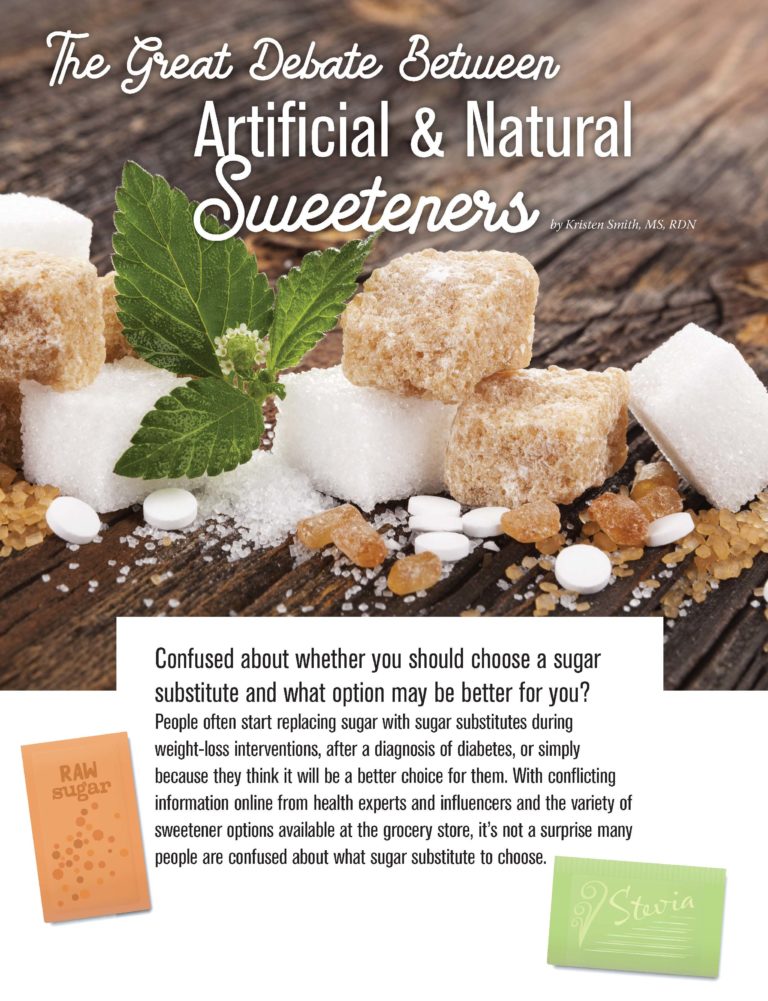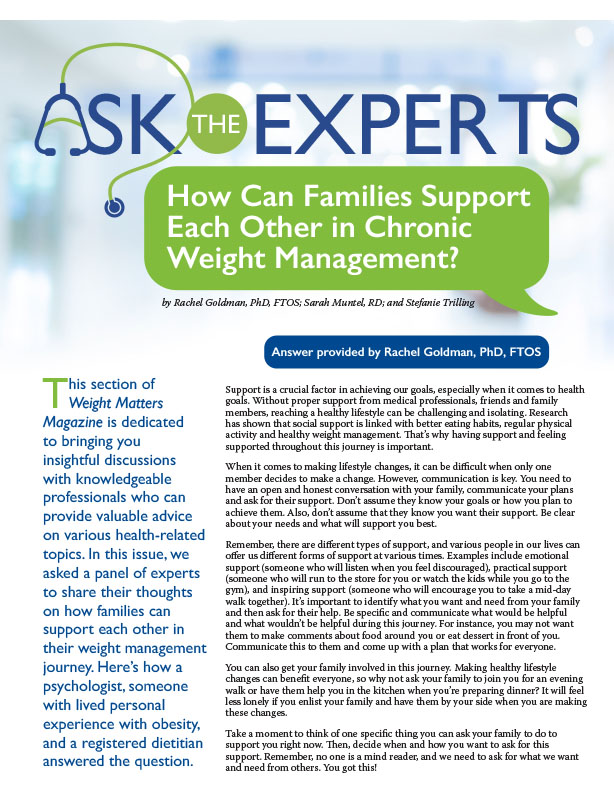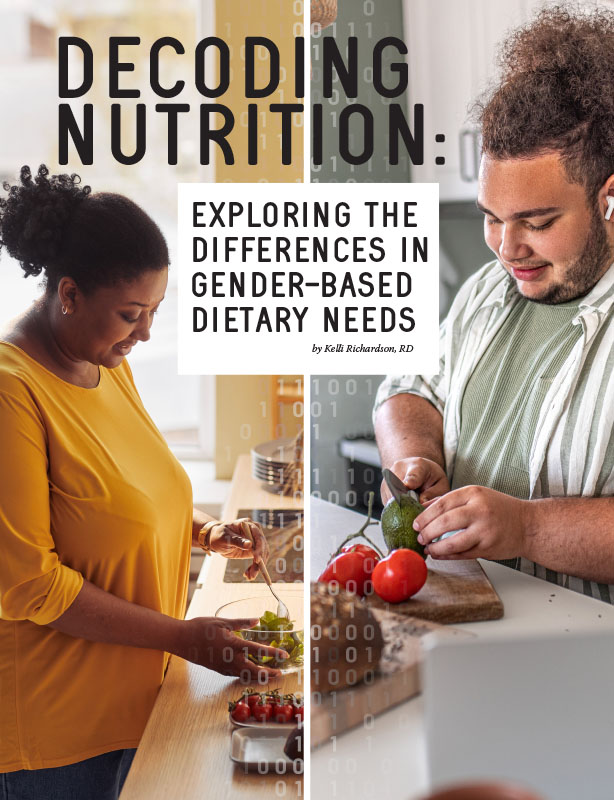The Great Debate Between Artificial & Natural Sweeteners


by Kristen Smith, MS, RDN
Fall 2022
Confused about whether you should choose a sugar substitute and what option may be better for you? People often start replacing sugar with sugar substitutes during weight-loss interventions, after a diagnosis of diabetes, or simply because they think it will be a better choice for them. With conflicting information online from health experts and influencers and the variety of sweetener options available at the grocery store, it’s not a surprise many people are confused about what sugar substitute to choose.
Sugar substitutes are not all created equal and come in a variety of textures and chemical compositions. The most commonly available sugar substitutes are artificial and natural sweeteners. Artificial sweeteners typically offer minimal calories and are created synthetically; however, they can also be made from natural substances like herbs. Natural sweeteners normally come from natural sources and are often minimally processed.
It’s important to evaluate the pros and cons of both artificial and natural sweeteners before deciding which is better for you and your health.
Artificial Sweeteners
Artificial sweeteners offer a minimal-calorie manufactured alternative to traditional caloric sugars such as table sugar and high fructose corn syrup. They can be used in a variety of recipes and products, including beverages, baked goods, snack foods, candy, canned goods and dairy products. The usage of artificial sweeteners has significantly increased over the past decade and is expected to continue to be on the rise. Artificial sweeteners make up a large percentage of the sugar substitute market. While artificial sweeteners continue to be popular among many, others still question whether they offer a health benefit.
Examples of Artificial Sweeteners Available:
- Acesulfame Potassium (Sunett® and Sweet One®)
- Aspartame (NutraSweet® and Equal®)
- Neotame (Newtame®)
- Saccharin (Sweet Twin®, Sweet’N Low®, and Necta Sweet®)
- Sucralose (Splenda®)
Pros of Artificial Sweeteners
Artificial sweeteners can be an attractive option because they have little to no calories. They can usually replace table sugar in a variety of recipes and commercially prepared food and beverages. When using artificial sweeteners in recipes, you may notice a lighter color, different texture or atypical sweetness; however, most people are typically still satisfied with the recipe outcome. Many companies who manufacture artificial sweeteners offer suggestions for how to replace sugar on their packaging or company website.
While in recent years, there have been many debates over whether artificial sweeteners can have negative health effects, numerous studies confirm that artificial sweeteners are generally safe in limited quantities. Furthermore, according to the National Cancer Institute and other various health agencies, there is a lack of evidence any of the artificial sweeteners approved in the United States are linked to critical health outcomes. The Food and Drug Administration has established an acceptable daily intake (ADI) for each artificial sweetener.
Cons of Artificial Sweeteners
Artificial sweeteners have a higher sweetness potency and often have a sweeter mouth feel than sugar. When people first try a food or beverage sweetened with an artificial sweetener, the intensity of the sweetness often leads them to believe the food must have sugar. Some of the sweeteners can be 200 to 13,000 times sweeter than standard table sugar. A sweeter flavor can cause some people to crave more sweetened foods. In addition to their potent sweetness, some artificial sweeteners may leave a bitter aftertaste.
While artificial sweeteners available on the market in the United States have been found to be safe when consumed within acceptable limits, the daily intake should still be kept in moderation. It’s also important to remember that foods with artificial sweeteners still have calories and carbohydrates and they should be taken into consideration when planning meals and snacks.
Natural Sweeteners
At a time when people are increasingly aware of what they eat, we are seeing a continued interest in natural foods. While natural sweeteners are still considered an added sugar, they are less processed and a more natural option than standard table sugar, making them very appealing.
Foods Used as Natural Sweeteners:
- Honey
- Dates
- Maple syrup
- Molasses
- Agave nectar
Pros of Natural Sweeteners
Unlike both artificial sweeteners and sugar, natural sweeteners may contain small amounts of antioxidants, vitamins and minerals. Some natural sweeteners are used for their anti-inflammatory, antioxidant or antibacterial effects. Pure maple syrup and raw honey are examples of natural sweeteners that have antioxidant benefits and contain prebiotic oligosaccharides that can help promote healthy gut bacteria.
Cons of Natural Sweeteners
An important concept to understand about natural sweeteners is that most still contain a substantial amount of carbohydrates and calories. For example, agave nectar has a similar amount of carbohydrates and calories as table sugar but provides a more intense flavor per unit of measurement. For individuals who are trying to manage their calorie and carbohydrate intake, natural sweeteners typically don’t offer any benefit. They can still contribute a substantial number of calories to a diet and raise anyone’s blood sugar, especially someone with diabetes.
While you might find some commercially prepared products made with natural sweeteners, they are typically more difficult to find. Most natural sweeteners can’t replace sugar 1:1 in recipes and require original measurements. Recipes using pureed dates have increased over the past several years. Honey, maple syrup and agave nectar are also found in recipes like smoothies, puddings, oatmeal and some baked goods.
The Bottom Line
Regardless of what sweetener you choose, sweeteners should be consumed in moderation as part of a balanced diet that includes vegetables, fruits, lean protein, healthy fats and whole-grain food sources. Make sure you look at the pros and cons of both before choosing what is best for you and your health!
About the Author:
Kristen Smith, MS, RDN, is a bariatric surgery program coordinator in Atlanta, Georgia. Kristen has been a practicing registered dietitian for nearly two decades and is a national spokesperson for the Academy of Nutrition and Dietetics. Her nutrition expertise has been featured in interviews on Good Morning America, The New York Times, WebMD, US News and much more.
by Rachel Goldman, PhD, FTOS; Sarah Muntel, RD; and Stefanie Trilling Winter 2024 This section of Weight…
Read Articleby Kelli Richardson, RD You’ve probably heard the generic advice before: Eat your fruits and veggies. Limit…
Read Articleby Cassie Story, RD Fall 2023 As the crisp autumn breeze sets in and the leaves start…
Read Article








